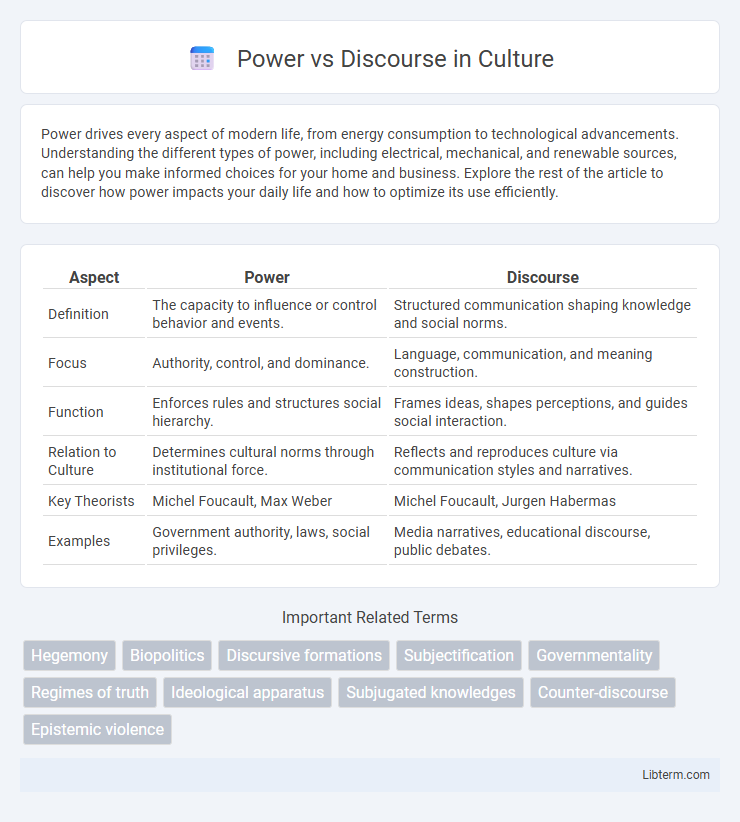Power drives every aspect of modern life, from energy consumption to technological advancements. Understanding the different types of power, including electrical, mechanical, and renewable sources, can help you make informed choices for your home and business. Explore the rest of the article to discover how power impacts your daily life and how to optimize its use efficiently.
Table of Comparison
| Aspect | Power | Discourse |
|---|---|---|
| Definition | The capacity to influence or control behavior and events. | Structured communication shaping knowledge and social norms. |
| Focus | Authority, control, and dominance. | Language, communication, and meaning construction. |
| Function | Enforces rules and structures social hierarchy. | Frames ideas, shapes perceptions, and guides social interaction. |
| Relation to Culture | Determines cultural norms through institutional force. | Reflects and reproduces culture via communication styles and narratives. |
| Key Theorists | Michel Foucault, Max Weber | Michel Foucault, Jurgen Habermas |
| Examples | Government authority, laws, social privileges. | Media narratives, educational discourse, public debates. |
Defining Power and Discourse
Power is defined as the capacity to influence or control the behavior and beliefs of others within social structures, often exercised through authority, coercion, or persuasion. Discourse refers to the structured ways of speaking, writing, and thinking that shape knowledge, social norms, and power relations within a society. The interaction between power and discourse reveals how language and knowledge systems sustain or challenge power dynamics through the production and regulation of meaning.
Historical Perspectives on Power
Historical perspectives on power reveal evolving dynamics between authority and knowledge, where power is not solely repressive but productive, shaping societal norms and truth through discourse. Michel Foucault's analysis identifies discourses as systems of knowledge that govern social behavior and legitimize power structures across institutions like prisons, schools, and hospitals. Understanding power through discourse highlights how historical contexts influence the formation of ideologies, reinforcing or challenging dominant social orders.
The Evolution of Discourse Theory
Discourse theory has evolved significantly through the work of Michel Foucault, who emphasized the intrinsic link between power and knowledge, shaping how societal norms and truths are constructed. The concept of power in discourse moves beyond mere repression to include productive forces that create subjects and social realities. Contemporary discourse theory expands this framework by analyzing how language practices influence power relations across institutions, media, and political frameworks.
Power Relations in Social Structures
Power relations in social structures shape interactions by influencing access to resources, decision-making authority, and social norms. These dynamics manifest through institutional practices, cultural narratives, and organizational hierarchies, reinforcing dominance and marginalization. Analyzing power within discourse reveals how language and communication sustain inequalities and shape social realities.
Discourse as a Tool of Power
Discourse functions as a powerful tool for shaping social realities by controlling knowledge, norms, and practices within a society. It enables dominant groups to establish and maintain power by framing what is considered true, normal, or acceptable, influencing public opinion and institutional policies. Through mechanisms like language, narratives, and symbolic systems, discourse perpetuates power relations and legitimizes authority in various social, political, and cultural contexts.
Language, Ideology, and Social Control
Power operates through discourse by shaping language to reinforce dominant ideologies that maintain social control and hierarchy. Language acts as a tool for embedding and perpetuating power relations, subtly influencing how individuals interpret reality and conform to societal norms. Ideological frameworks embedded in discourse legitimise authority and regulate behaviour, sustaining systemic inequalities and enabling social governance.
Foucault’s Concept of Power and Discourse
Foucault's concept of power emphasizes that power is not merely repressive but productive, operating through discourse to shape knowledge, norms, and social realities. Discourse functions as a system of representation that governs how subjects are understood and controlled within society, making power relational and pervasive. This interplay reveals that power and discourse co-constitute each other, producing truths that sustain power structures embedded in institutions and social practices.
Resistance and Counter-Discourses
Resistance emerges as a critical force challenging dominant power structures embedded within discourse, enabling marginalized groups to articulate alternative narratives. Counter-discourses destabilize hegemonic language by exposing inherent contradictions and promoting diverse perspectives that contest normative ideologies. These oppositional discourses foster social transformation by empowering disenfranchised voices and facilitating critical reflection on power relations in society.
The Impact of Power on Knowledge Production
Power dynamics shape knowledge production by influencing which voices and perspectives are validated or marginalized in discourse. Foucault's theory highlights how dominant power structures determine accepted truths, shaping academic, scientific, and cultural narratives. This control over discourse affects epistemological frameworks, reinforcing inequality and limiting diverse knowledge systems.
Contemporary Examples of Power Dynamics in Discourse
Contemporary examples of power dynamics in discourse are evident in social media platforms where influencers and algorithms shape public opinion and control information flow. Political debates and media coverage often highlight how language frames power relations, privileging certain voices while marginalizing others. Corporate communication strategies also reveal power through discourse by controlling narratives to influence consumer behavior and public perception.
Power Infographic

 libterm.com
libterm.com